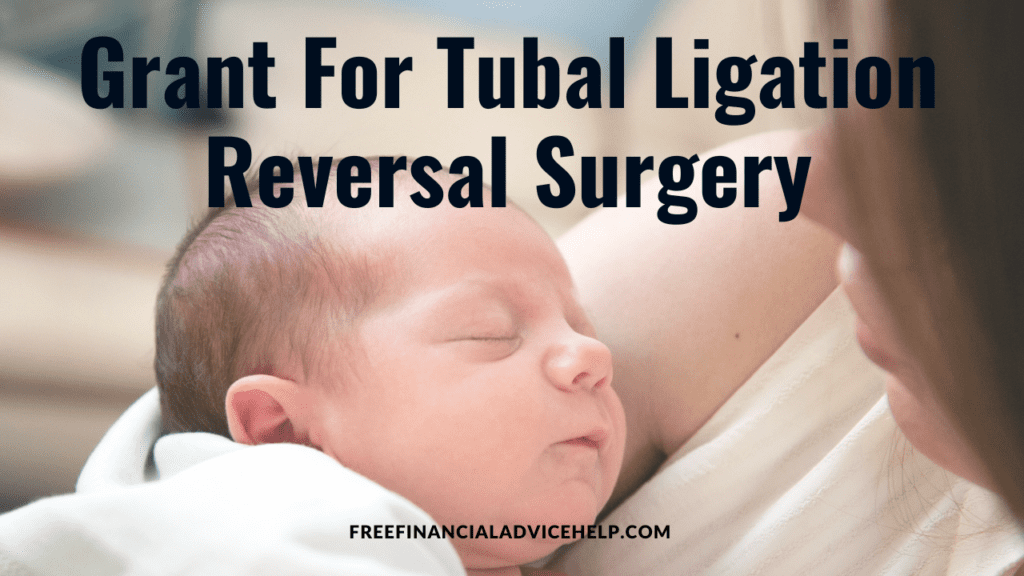Apply for Free Tubal Reversal Grants Money
I was looking through Yahoo Answers today and ended up reviewing some of the answers on single mother hardship grants and tubal reversal grants.
Granted the answers are given by people trying to be helpful, some at least, but it’s a shame some of these answers are wrong, including the ones voted or picked as the best answer.
Today, standard tubal reversal surgeries in the United States cost about $7,500. For many, that’s a huge number.
So it’s understandable when people are looking for grants for tubal reversal surgery. But does the government or nonprofit program or institution offer such tubal reversal grants?
Apply for Free Tubal Reversal Grants Money
In this article, I will point out some of the wrong answers and provide better information about the cost of tubal reversal.
However, I should note that there were some very well-crafted answers that provided the tubal reversal grants information requested.
How To Apply for Tubal Reversal Grants?
Some questions are just real requests for the cost of a tubal reversal. For one, a responder said tubal reversals cost at least $10,000 and up to $20,000, with a success rate of less than 50%. While it is true that such costs are quoted to you, this minimum amount is very wrong.
While a responder may have jokingly responded to another request with a price tag of $500, you won’t find it quite that low unless you’re very lucky and have health insurance to cover the cost. Maybe that’s your co-payment.

However, in the US, you can find tubal reversal grants starting at around $3700 and up. The average cost for a tubal reversal is around $8000 to $9000, but there are some tubal reversal doctors who are highly qualified to perform the surgery and charge in the $5500 to $7000 range.
These doctors are specialists who do little if anything other than reverse tubal ligation surgery. You will find that they tend to be the more experienced and best-trained doctors as well.
Also, the less than 50% success rate is so bogus that I just have to bring it up. Although pregnancy success rates after tubal reversal can vary depending on various factors, there is a success rate of up to 87% per study.
The rate depends on factors such as age, tubal length, and tubal ligation method, at least in one study available on the internet. If you are over 40, the success rate is less than 50%, but not for all women overall.
Free Tubal Reversal Near Me
A similar response was given to several questions about the cost of tubal reversal. In it, the responder says tubal reversal is very expensive, one says at least $20,000 if not more, and says it would probably be better to opt for IVF.
The reason given here is that tubal reversals are not always successful and you would probably end up with IVF-free tubal reversal near me anyway.

It might surprise you to learn that IVF isn’t as good as many fertility specialists and others would have you believe, even if you disregard everything you need to do to your body to prepare for the procedure.
On average, IVF costs $10,000 to $12,000 per cycle. On average, you should expect to go through three cycles before getting a hit. If you use frozen embryos, subsequent cycles can be less costly.
Low-Income Tubal Reversal
You can do better or worse than three cycles and you might find a price below or above the given range. But by using averages we can make a better comparison. Apply tubal reversal grants money for surgery.
However, the low-income tubal reversal average cost of a tubal reversal is $8,000 to $9,000 and you only need to have one surgery. Granted, not every surgery will be a success and not every tubal ligation is reversible, although it’s amazing what they can fix now, like Essure procedures. However, as mentioned above, some of the top tubal reversal doctors in the US and the world charge less than this average.
The last answer I wanted to speak to was that surgery is like shoes and you pay more for quality. I really have to disagree. Some of the best tubal reversers in the world fall in the $5500-$7000 range as I mentioned above.
Tubal Reversal Under $3,000 Near Me
They have the education, training, background and experience that make them the elite of tubal reversal doctors, or more specifically, doctors who perform tubal reversal surgery. Compare their tubal ligation reversal skills to those of surgeons charging over $30,000.
You can do this through their websites and other tubal reversal under $3,000 near me sources. Does this surgeon who wants to charge you $30,000 give you direct access to his qualifications and how do they compare?
If you really want to learn more about tubal reversal grants, just watch the YouTube video at this link. Alternatively, you can browse the cost pages, message board and even the Success Rate Study at www.tubal-reversal.net to learn more about the Tubal Reversal Physician’s training and experience and the procedure at Chapel Hill tubal reversal grants center.
Why should a woman and her partner seek tubal reversal funding?
Most women who have tubal ligation performed consider it a permanent form of sterilization. They have no intention of ever having more children, so they tied off their hoses to prevent that.
However, some women later regret the decision because their circumstances change or they simply change their minds. In these cases, these women may choose to have reversal surgery. As with any medical procedure that is not covered by insurance.
A woman must budget for the procedure to be performed. This is where the issue of Tubal reversal grants funding comes into play.
How to get insurance to pay for a tubal reversal?
There are few doctors in the United States who perform tubal reversal surgeries on a consistent schedule, that is, every week. These reversals are usually much cheaper than, say, in vitro fertilization.
For in vitro treatments, you can expect to pay anywhere from $10,000 to $12,000 per cycle. That’s the average and often a cycle can cost a lot more. In other words.
If the woman does not get pregnant during the first cycle of in vitro fertilization, she would have to pay for further cycles. Also, she has only been able to be successful in the months she has been doing IVF.
On the other hand, surgery to detach her fallopian tubes would give a woman the chance to conceive every month she decides to try.
This is a permanent reversal, so no extra hormone injections or extra funds would be required to keep trying to conceive every time you want to try. And on average, you will keep trying.
Health Insurance Covering Tubal Ligation Reversal Surgery
Most health insurance companies will not cover tubal reversal surgery because it is an elective procedure. However, very few will cover it or parts of it (this is option #1).
It is therefore important that you first check with your tubal reversal grants provider whether you have network coverage. Some insurance companies may pay part of the surgery or some of the necessary preparations, while others don’t pay a dime for it.
Because this is not considered necessary, many insurance providers simply reject the claim. Find out before your surgery.

Tubal reverse funding is really a personal decision. While you can expect to pay less than $7000 for the procedure with the country’s top-notch surgeon, for many people that’s still a sizable sum.
Grants for tubal reversal
One thing you can do is speak to your surgeon’s office to find out what your tax deduction options are when it comes to tubal reversal grants funding the procedure. Payment plans are often available to them
- There are also tried and tested methods of simply opening a savings account to save for your surgery
- Transferring the surgery to a credit card
- Use your income tax refund if it’s large enough
- Take out a loan for the surgery
Another form of tubal reversal financing is special government grants and medical loans that some companies offer. As it is different from the commonly accepted loans and most people don’t even know medical loans exist).
Consultations
Another way to fund your surgery is to find and apply for tubal reversal grants (Option #8). Most organizations offering such scholarships are faith-based, which means you will most likely have to adhere to some specific guidelines.
While insurance probably won’t cover your surgery, you’ll need to come up with some other form of tubal reversal financing, but there are several government tubal reversal grants money and personal grants for bills options available.
The 8 options above range from paying off the credit card right away, taking out a medium-term loan, medical or otherwise, to saving for the surgery long-term. Which one you choose depends on you and your situation.
